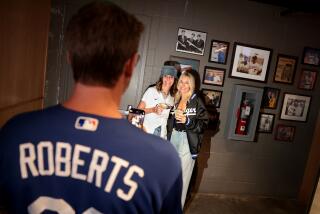Tigersâ Clubhouse Man Has Dirty Job, but Somebodyâs Got to Do It
DETROIT â Itâs 6:30 a.m. and the sultry summer sun casts an eerie light around the odd shapes and corners of Tiger Stadium as Rip Collins pulls into the parking lot.
The Seattle Mariners, who played in Cleveland, arrived in the middle the night with wet, dirty uniforms and itâs Ripâs job to get the stuff clean.
Collins, 68, runs âRipâs Roost,â the name the players have put on the visitorsâ clubhouse at Tiger Stadium. Itâs a job heâs held since 1975 and, frankly, he canât imagine doing anything else. Collins has parlayed a never-ending line of dirty underwear, crabby ballplayers and picking up after grown men into a comfortable living.
âThese arenât the bad guys,â Collins says. âThey arenât the enemy as far as Iâm concerned. Theyâre away from home. They need some attention, thatâs all.â
A truck arrives at 9:30 a.m. with the rest of the Marinersâ equipment and Collins and four helpers begin unpacking bags and hanging the contents in lockers.
Collins is employed by the Tigers but the tips are what make the job worthwhile. Billy Martin, when heâs working, normally leaves him $175 after a three-game stand. Cal Ripken Jr. writes a check for $160.
âThe managers are all good,â Collins says. âTony LaRussa is very generous. Some of the older fellows are $10 a day guys. The ones that came up the hard way.â
A little past noon, Collins shifts to his role as supply sergeant as he steers his car out the stadium parking lot, heading on a shopping mission. He stocks up on fruit juices, candy, tobaccos--for chewing and smoking--and beer. He buys the goodies and pays for the nightly food spread from his own pocket, knowing heâll make it back in tips.
Confidence has never been a problem with Charles Collins, a man who was raised in the Corktown neighborhood adjacent to the ballpark.
During World War II, he applied for gunnery school and somehow ended up at pre-flight school in Chapel Hill, N.C.
While at Chapel Hill he played on the post baseball team, known as the Cloud Buster Nine, with a young Marine pilot named Ted Williams. Thatâs where he earned the nickname âRipâ which has stuck.
During the Korean War, Collins flew 129 missions, made 120 day carrier landings and 50 more at night.
âNow thatâs a thrill a minute,â he says.
He returned in 1952 with two Distinguished Flying Crosses and eight Air Medals.
Collins began his career as an equipment man in 1962, working as an assistant for the Detroit Lions. Twenty years later, Collins became head equipment man for the Detroit Wheels of the short-lived World Football League, thereby beginning one of the great adventures of his life.
âBoy that was a humdinger. Whooeeee,â Collins recalls, rolling his eyes and working his cigar a little harder. âIt was so badly run. I remember one time the business manager came out to practice to hand out pay checks. The kids were stuffing them in their jocks, they didnât know what to do.â
The club folded one day while he was washing the uniforms.
Late in 1974 Collins was offered the Tiger Stadium job. He started the next season and is now a fixture.
Some of the Seattle players arrive about 3 p.m. for some early batting practice. An hour or so later, theyâre clamoring for dry underwear and Collins has it ready. There are few surprises any more.
Earlier, when the Red Sox were in town, Rip and the boys spent half the week sewing buttons on Bostonâs new uniforms because the factory did a poor job.
Rip is wearing a gold Mariners pendant around his neck, having removed the California Angels pendant and slipped it into a drawer earlier in the day.
While the game is going on outside, Collins and his crew tidy up, do a little laundry and, if theyâre lucky, watch some television. Early in the season thereâs always a hockey game tuned in.
âIâm not much of a (baseball) fan,â Rip says. âI really donât care much for the baseball games. I never pay any attention to them, to tell you the truth. I love to watch hockey.â
In the seventh inning, they start setting the table for the food spread.
If Collins has an Achillesâ heel, itâs the spread, generally a heavy combination of greasy meat, potatoes, gravy, white bread and salad, washed down with milk or beer. Many players complain about the spread, which mystifies Collins, who has it catered either by âthree Polish ladies who turn out good food.â
The players eat, but itâs clearly an ordeal for both sides.
âThatâs the worst part of this job,â he says. âWeâve got to do it because thereâs only a few places to eat after 10 oâclock at night. But you just canât please everybody.â
After the game, the clubhouse is a frenzy of motion and sound.
The 45 minutes until the Marinersâ bus leaves for the hotel are hectic for Collins and the boys. A radio blares, the showers hiss and reporters and camera crews make the already too-small room even tighter. People try to squeeze around the table ladden with food. Dirty uniform parts fly through the air from all directions, tossed generally toward large cloth hampers which can be loaded easily onto a laundry truck. Up near the door, a boy begins knocking mud and dirt from a mountainous pile of spiked shoes which all must be cleaned and polished.
Everybody wants something--at once. Then, just as suddenly, the crush is over, the bus departs and itâs quiet.
Somebody begins cleaning the pots and pans from the spread, somebody else cleans the shower room, the rug is vacuumed, underwear is turned inside out, ready to be washed first thing in the morning.
At 12:40 a.m. Collins pops a smart salute to the night man guarding the main gate. Trash blows around the ballpark as he heads for home.
âIâm glad there wasnât any rain delay tonight,â he says. âI hate rain delays. The players come up the tunnel and eat and drink you out of house and home.â
Light from the vapor lamps catches two large rings, one on each of Collinsâ strong hands. One is from the Tigers, from the 1984 World Series championship, the other from the Lions NFL championship in 1957.
âIâve been coming and going from this ballpark a long time,â he says. âIâve got a pass with Frank Navinâs signature on it. Theyâd give them to the kids for picking up trash.
âIâve lived around here all my life, but Iâve never grown tired ot it. Iâm a lucky guy.â
More to Read
Go beyond the scoreboard
Get the latest on L.A.'s teams in the daily Sports Report newsletter.
You may occasionally receive promotional content from the Los Angeles Times.










